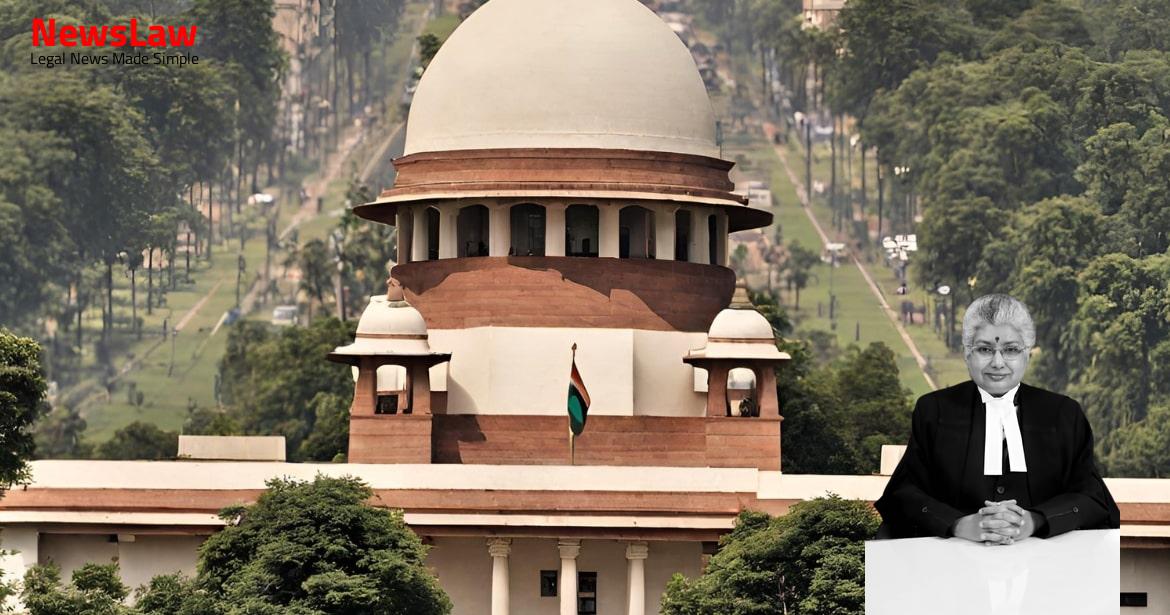Dive into the intricate legal analysis by the court on interpreting strict narcotics laws in a recent case. The judgement sheds light on the significance of chemical analyses in proving contraband materials and emphasizes the essential role of legislative intent in legal interpretations. Stay tuned for a comprehensive look into the complexities of applying stringent laws in real-world scenarios.
Facts
- On 25 July 2003, police officials received information about ‘poppy husk’ being stored at the respondent’s premises.
- A raiding party was formed after fulfilling formalities under the 1985 Act and the premises were searched.
- Samples were sent to the Chemical Examiner, who confirmed the presence of ‘poppy husk’.
- Eight gunny bags each containing 40 Kgs. of ‘poppy husk’ and one bag with 30 Kgs. were recovered based on the respondent’s disclosure.
- It was found that the respondent was engaged in illicit trading of ‘poppy straw’ and had stored a huge quantity of it in the room meant for cattle fodder.
- The respondent was charged under Section 15(c) of the 1985 Act for possessing a commercial quantity of ‘poppy straw’.
- Union of India directed to be impleaded as second respondent.
- High Court found tests conducted by Chemical Examiner insufficient.
- Important questions of law identified during appeal proceedings.
- High Court concluded tests did not indicate stuff was ‘poppy straw’.
- Prosecution failed to prove sample as ‘poppy straw’.
- High Court allowed appeal, set aside previous conviction and sentence.
- State appealed High Court’s decision before this Court.
- Respondent pleaded not guilty, trial court found respondent guilty.
- Respondent sentenced to undergo rigorous imprisonment and pay fine.
Also Read: Presumption of Genuine Endorsements in Cheque Case
Arguments
- Shri Jain submitted that the provisions of the 1985 Act are stringent, requiring a strict interpretation.
- Shri Parameshwar raised three key issues for consideration regarding the identification of contraband material.
- Shri Mukerji highlighted the mention of ‘papaver somniferum L’ as the chief source of ‘opium’ in authoritative sources.
- The AAG emphasized the duty of the State to enforce prohibition as per constitutional and international commitments.
- The AAG noted that ‘papaver somniferum L’ is the primary source of ‘opium’, but other species require notification by the Central Government to be included under the 1985 Act.
- Shri Parameshwar agreed with the obligation to adhere to international conventions and emphasized the need for specific notification for other species of ‘papaver’.
- The AAG outlined the definitions and penalties under the 1985 Act related to ‘poppy straw’ and the presence of alkaloids.
- The AAG referenced the ‘2021 Manual’ for required tests to detect ‘opium/crude morphine’ and ‘meconic acid’.
- Shri Mukerji disagreed with the High Court’s view on the sufficiency of tests to determine if the species belongs to ‘papaver somniferum L’.
- The ASG and the AAG emphasized the need to interpret the 1985 Act in a manner that advances its purpose, which may not warrant interference with the High Court’s judgement.
- In the case of Harjit Singh v. State of Punjab, the chemical analysis of contraband material was deemed essential to prove a case under the 1985 Act.
- Gujarat High Court and Himachal Pradesh High Court also held similar views in cases related to contraband material.
- Justice Hidayatullah in the case of Baidyanath Mishra v. The State of Orissa stated that if the evidence suggests it could be ‘opium’, further analysis may not be necessary.
- The amicus curiae, Shri Parameshwar, presented both sides for the Court to decide in the interest of justice.
Also Read: Medical Negligence and Compensation: A Landmark Decision
Analysis
- The judgement discusses the definition of ‘poppy’ as per the 1953 Protocol and the 1985 Act.
- It emphasizes the importance of the chemical analysis of contraband material to prove a case under the 1985 Act.
- The judgement highlights the recognition of ‘papaver somniferum L’ as the main source for the production of ‘opium’ in international conventions and scientific studies.
- It mentions the amendments made to the definition of ‘opium poppy’ to cover additional species that yield ‘opium’.
- The role of international developments in interpreting and enforcing the 1985 Act is emphasized.
- It addresses the necessity of close collaboration between contracting parties for effective control of narcotic substances.
- The intent of the 1985 Act to curb drug trafficking and the need for a comprehensive legislation to address the challenges are discussed.
- Opium poppy is defined in the 1985 Act and includes other species of papaver from which opium or any phenanthrene alkaloid can be extracted.
- Punishments for contravention in relation to poppy straw are outlined in Section 15 of the 1985 Act.
- The definition of opium, opium derivative, poppy straw, and poppy straw concentrate are provided in Section 2 of the 1985 Act.
- Poppy straw is defined as all parts of opium poppy after harvesting, excluding the seeds.
- In cases of contravention related to poppy straw, it is essential to refer to the definition of opium poppy.
- Opium is defined under Clause (e) of Section 2 of the 1985 Act as the capsules of the poppy, coagulated juice, or mixtures containing morphine below 0.2%.
- The Maharashtra Prohibition Act, 1949 also provides a definition of opium.
- Section 630 of the Act deals with the wrongful withholding of company property by officers or employees.
- The 1878 Opium Act defines opium as capsules of the poppy, coagulated juice, and mixtures, excluding preparations with more than 0.2% morphine.
- Penal statutes are to be strictly construed, but also fairly interpreted according to legislative intent.
- Courts may have functional approaches and look into legislative intention for effective interpretation of statutes.
- The legislative purpose must be kept in mind while interpreting provisions of the Act.
- Courts should reject constructions that defeat legislative intent even if language is imprecise.
- Statutes must be construed to be operative and effective, not inept.
- The purpose of the legislation should be to achieve the cure intended by Parliament.
- Courts should adopt a construction that advances the remedy and suppresses mischief.
- Once ‘poppy straw’ tests positive for morphine and meconic acid, no further tests are necessary to establish guilt under Section 15 of the 1985 Act.
- Both perspectives of the accused and the prosecution were presented adeptly by Shri Parameshwar.
- The High Court’s judgment and order have been overturned, necessitating the accused to surrender.
- Shri Parameshwar and Shri Mukerji extensively researched scientific studies and relevant material at national and international levels, for which they are greatly appreciated.
Also Read: Remand of Writ Petition for Restoration and Decision on Merits
Decision
- The appeal is allowed based on a specific ground identified by the High Court
- The matter is remanded back to the High Court for fresh consideration
- The sentence is suspended until the High Court makes a decision on merits
- Any pending applications will be disposed of accordingly
- No costs are ordered
Case Title: THE STATE OF HIMACHAL PRADESH Vs. NIRMAL KAUR @ NIMMO (2022 INSC 1121)
Case Number: Crl.A. No.-000956-000956 / 2012



